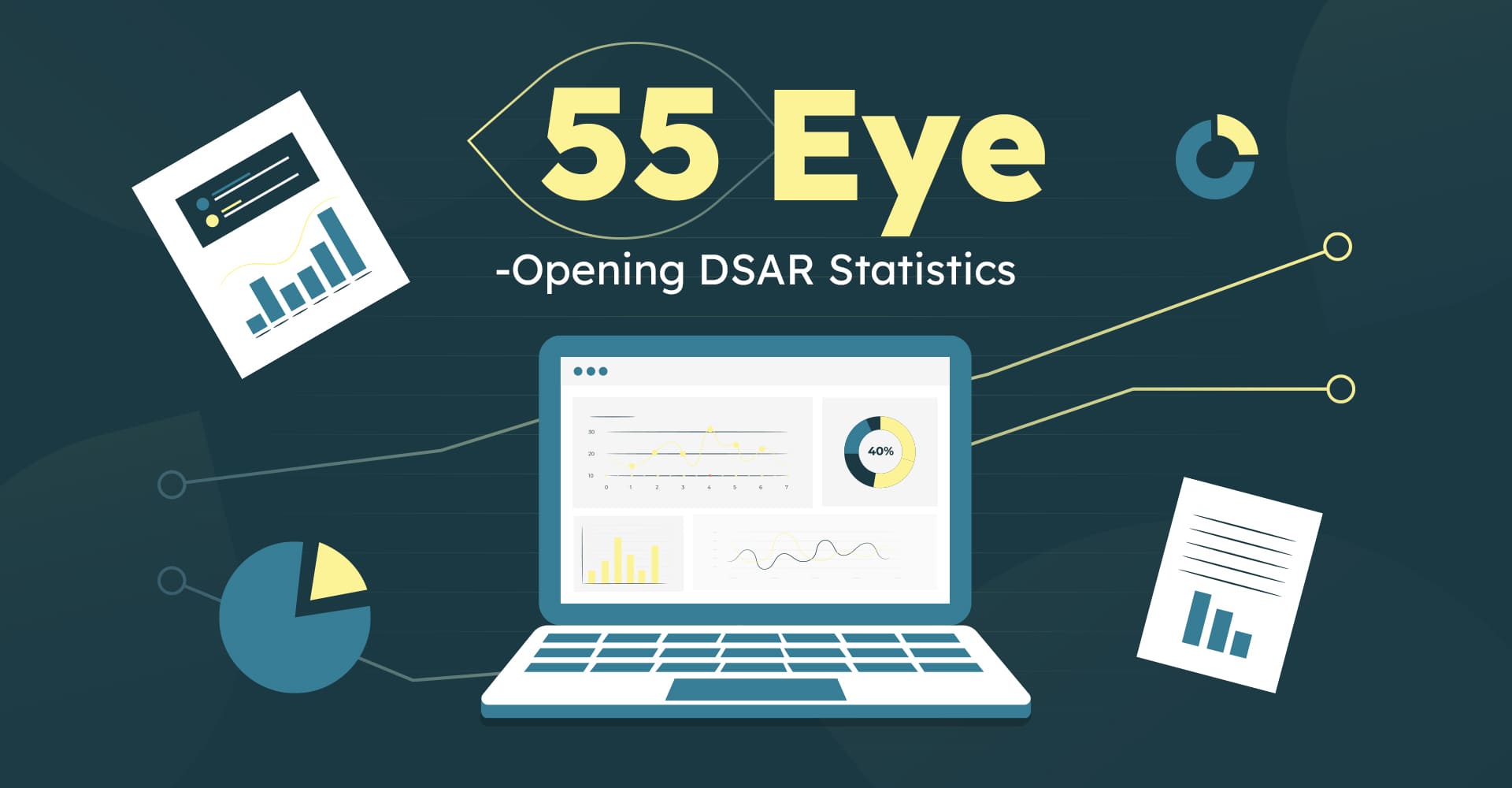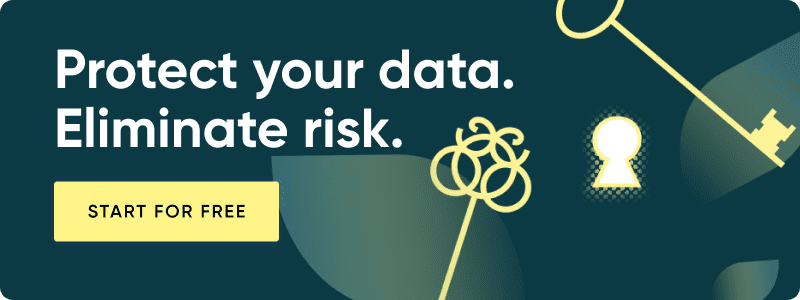Data Subject Access Request (DSAR) Statistics for 2023

Table of Contents
Data Subject Access Requests (DSARs) are a mandatory provision under the California Consumer Privacy Act, and grant consumers the right to ask companies for a copy of the personal information they hold on you as well as the option to modify or delete it.
DSARs aren't optional — they're meant to be taken seriously. In the post below, we'll show you how attitudes toward privacy have changed in America and the world. These statistics indicate that companies ought to give data deletion requests the priority they deserve — or risk losing customers to the competition, negative PR, and more.
55 Eye-Opening DSAR Statistics
We've sorted each DSAR statistic into sub-categories, showing interest in data privacy, data breach management, customer loyalty, and more. Let's dive in:
Statistics That Show Growing Interest in Data Privacy
- 61% of people actively interested in their data usage are younger than 45 years old. (Cisco Consumer Privacy Survey 2019)
- 84% of individuals stated that they were concerned about their data privacy and the data privacy of others. (Cisco Consumer Privacy Survey 2019)
- 80% of the above-mentioned group indicated they would be willing to help with data protection. (Cisco Consumer Privacy Survey 2019)
- 45% of respondents feel it is the government’s responsibility to protect personal data.(Cisco Consumer Privacy Survey 2019)
- While 21% have stated that it is a company’s responsibility to enforce data protection. (Cisco Consumer Privacy Survey 2019)
- 48% of privacy-active respondents have already changed providers or companies for better data sharing and privacy policies. (Cisco Consumer Privacy Survey 2019)
- According to the 79% of people showed a growing concern about how their data gets used by companies.
- 64% of individuals showed the same concern about how the government uses its data. (Pew Research Center)
- 81% of people feel they do not have as much control as they would like over their data.
- According to Salesforce, 46% of consumers don’t feel in control of their data.
Statistics of Data Privacy Awareness in the USA
- Unfortunately, 63% of Americans have reported that they know very little about data privacy laws and regulations. (Pew Research Center)
- A whopping 97% of Americans state that they are not asked to approve or agree to data privacy policies. (Pew Research Center)
- 38% of adults have admitted they sometimes read privacy policies. (Pew Research Center)
- While 36% admitted that they never read the privacy policy of a company before approving it. (Pew Research Center)
- 62% of Americans feel it is impossible for companies not to collect data about their consumers. (Pew Research Center)
- 81% of people in America believe that more risks come with data collection than rewards. (Pew Research Center)
- 72% of Americans feel that almost all of their online activities get tracked by companies.
- 70% believe their data is less secure now than it was 5 years ago. (Pew Research Center)
- 79% of Americans show no confidence in the way companies use their data.
- About 70% don’t think companies will show accountability or take responsibility when data is misused. (Pew Research Center)
Data Security and Data Security Breaches DSAR Statistics
- 41% of consumers don’t believe that certain companies have their best interest at heart when it comes to their data. (Salesforce research)
- 84% of consumers show more loyalty to companies that guarantee the strong security of their data. (Salesforce research)
- According to a 2019 EU Agency Report for Fundamental Rights, 87% of Europeans voiced their concerns about cybercrime and data security breaches.
- The total cost of data breaches in the USA amounted to $8.19 million, which is twice the global average. (IBM)
- Companies and organizations without security automation had to cover security breach costs that were 95% higher than those with security automation. (IBM)
- In 2020, it took an average of 280 days for organizations to identify a security breach. (IBM)
- In the EU, there was an average of 278 security breach notifications per day between January 2019 to January 2022. (DLA Piper)
- In 2019, security breaches in the healthcare sector tripled. (IAPP)
- 58% of these breaches were hacking incidents. (IAPP)
- The healthcare sector also experienced the highest average security breach cost. (IBM)
- According to the Pew Research Center, EU-based companies are more likely to inform the authorities of a security breach than U.S.-based companies.
- 52% of EU countries informed the authorities of security breaches, whereas only 22% of U.S. companies notified the authorities. (Pew Research Center)
- Germany, the UK, and the Netherlands experienced more data breaches than any other country in the EU. (DLA Piper)
- 45% of data breaches are cloud-based breaches. (IBM)
- 60% of security breaches led to an increase in prices for customers. (IBM)
- 19% of security breaches occurred as a result of a compromise of a business partner. (IBM)
- According to the Cost of Data Breach Report of 2022, 83% of organizations reported more than one data breach.
- 52% of data breaches were considered to be malicious attacks. (IBM)
- While 25% of data breaches were caused by glitches in the system. (IBM)
- Only 23% were caused by human error. (IBM)
DSAR Statistics About Customer Loyalty and Trust
- 54% of customers agree that it is more difficult to put their trust in a company’s data protection policy. (Salesforce research)
- Naturally, 89% of consumers showed more loyalty to companies they can trust with their data. (Salesforce research)
- 65% of customers have reported that they stopped supporting companies that showed signs that they could not be trusted. (Salesforce research)
- 58% of consumers feel more comfortable with companies that are transparent about the way they use their personal data. (Salesforce research)
- However, 63% of consumers agree that most companies are not transparent with the way they use their data. (Salesforce research)
- 73% of customers have stated that company ethics are more important than they were a year ago. (Salesforce research)
- 80% of consumers have no problem sharing their personal data if it is used for personalized marketing or promotional messages. (Emarketer)
- When it comes to trustworthy companies, Amazon comes out at the top at 30%. (Marketing Dive)
- Google was a close second with 27%. (Marketing Dive)
- Uber came out as the least trusted with 5%. (Marketing Dive)
DSAR Statistics of Global Data Protection Laws
- 59% of organizations stated that they are currently up to standard with GDPR requirements. (Cisco Consumer Privacy Survey 2019)
- 3% of organizations don’t believe that GDPR applies to their organization. (Cisco Consumer Privacy Survey 2019)
- 47% of consumers agreed that they trusted an organization that uses their data according to GDPR standards. (Cisco Consumer Privacy Survey 2019)
- 36% of organizations stated that managing data protection practices of third-party organizations was the most difficult GDPR task. (IAPP)
- 52% of consumers agreed that they have more control of their personal data because of GDPR. (Cisco Consumer Privacy Survey 2019)

Osman Husain
Osman is the content lead at Enzuzo. He has a background in data privacy management via a two-year role at ExpressVPN and extensive freelance work with cybersecurity and blockchain companies. Osman also holds an MBA from the Toronto Metropolitan University.
